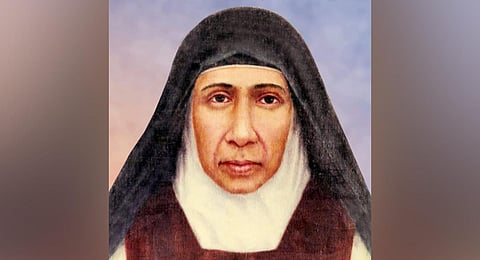Catholic Church to mark first Keralite nun’s elevation as ‘Venerable’
KOCHI: The Catholic Church in Kerala is celebrating the elevation of Mother Eliswa as ‘Venerable’, taking her one step closer to sainthood. Pope Francis had in November given the approval to exalt Mother Eliswa, founder of the first indigenous Carmelite congregation for women in the country.
On January 6, the archdiocese of Verapoly will hold a celebratory Holy Mass at Varapuzha St Joseph’s Convent.
Known as the first nun in the state, Mother Eliswa’s cause of canonisation was introduced in the archdiocese in 2007. She was declared a ‘Servant of God’ on May 30, 2008. The process of her beatification was completed in 2014. Mother Eliswa was born on October 15, 1831, as the eldest of eight children of Thomman and Thanda. She belonged to the Vyppissery family of Cruz Milagris parish of Ochanthuruth, Vypeen.
At a time when regular academic education of Catholic girls was rare, her family appointed tutors to educate her. It is said that Eliswa’s only desire was to love and serve Jesus by helping the poor and needy. But at the time, such a lifestyle was not considered suitable for women. Eliswa was married off at the age of 16 to Variad Vakayil, who hailed from a religious Latin Catholic family in Koonammavu. The couple was blessed with a girl child on April 21, 1850. But tragedy struck when in 1852, her husband passed away. Variad’s death led her to believe that earthly comforts are transitory and she decided to possess everlasting happiness by loving God more. She refused proposals for a second marriage and began to lead a strict spiritual life in her house. She also infused the same spirit in her daughter Anna. They were later joined by Eliswa’s younger sister Thresia.
In 1860, with the support of Fr Thomas Guyomar, who was the secretary of Bishop Bernardine Baccinelli and her maternal uncle, the trio shifted their residence to the ‘kalapura’, the coconut storage hut of the family. For 10 years (1852-62) she led a life of prayer, silence and solitude. During the time, the vicar apostolic of Verapoly Msgr Bernardine was making plans to bring the Discalced Carmelite nuns from Genova, Italy.
But when Fr Leopold, the spiritual director and confessor of Mother Eliswa, informed the monseigneur about the desire of the three women to lead a religious life, the bishop directed the construction of a shelter out of bamboo mat. The monsigneur received authorisation from the general of the Discalced Carmelite order in Rome and he then officially received Eliswa, Anna and Thresia into the order. On February 12, 1866, the three began residing in the bamboo-mat convent. Eliswa was given the religious name Sr Eliswa of Blessed Virgin Mary and was appointed the first superior of the new community.
The congregation she founded has today spread over 73 dioceses. It has 213 convents in India, Europe, Rwanda and the United States.
The four steps to sainthood
Servant of God: A person is formally called a ‘Servant of God’ when the diocesan process has been completed and the records are sent to the Holy See’s congregation for the causes of saints. Usually, that process is done in the diocese where the person died; it includes testimony about the person and copies of the person’s writings.
Venerable: After the congregation has reviewed the work at the diocesan level, it may publish a decree that this person indeed showed heroic virtues. After a panel of theologians has examined any writings from this person and found them to reflect the Catholic faith, then the person may be declared venerable.
Blessed: Next, a reported miracle must be examined by three teams that work independently: doctors, theologians and several cardinals. If they and the Pope agree that the cure was miraculous, the person can be officially declared blessed.
Sainthood: A second miracle, requiring the same process of approval, is needed before the person can be declared a saint and a liturgical observance permitted worldwide.

